MAP EXAM PRACTICE TEST FOR GRADE 5 MATH
Subscribe to our ▶️ YouTube channel 🔴 for the latest videos, updates, and tips.
Problem 1 :
Tim can stitch 1/5 meter of material every 2/3 hour. What is his unit rate per hour ?
(A) 1/3 meters per hour (B) 3/5 meters per hour
(C) 3/10 meters per hour (D) 1 1/5 meters per hour
Solution :
Given,
2/3 hour ----> 1/5 meter of material
1 hour = (1/5)/(2/3)
= (1/5) ⋅ (3/2)
= 3/10
= 3/10 meters per hour.
Problem 2 :
What is the number 27 in exponential form ?
(A) 27 (B) 33 (C) 39 (D) 93
Solution :
27 = 3 × 3 × 3 = 33
Hence, Option (B) is the answer.
Problem 3 :
In his science lesson, Jong measured out 365 milliliters of ethanol into a beaker for an experiment. How much in this in liters ?
(A) 365000 (B) 3650 (C) 3.65 (D) 0.365
Solution :
Given,
Quantity of ethanol = 365 milliliter
We know that, 1 liter = 1000 milliliter
= 365 ⋅ 1000
= 365000 liter
Therefore, 365000 liter.
Problem 4 :
What is 14.84 ÷ 0.7 ?
(A) 2.12 (B) 21.2 (C) 212 (D) 20.12
Solution :
Given, 14.84÷0.7
To write, 14.84/0.7
= (14.84/0.7) ⋅ (10/10)
= 148.4/7
By long division method,
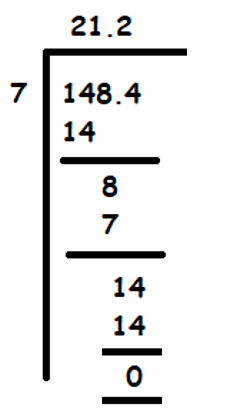
= 21.2
Therefore, 21.2 is the answer.
Problem 5 :
What is 7/8-1/6 ?
(A) 6/2 (B) 6/8 (C) 6/24 (D) 17/24
Solution :
Given,
7/8-1/6
For unequal denominators, to find LCM of 8 and 6 is 24
= (21-4)/24
= 17/24
So, the answer is 17/24.
Problem 6
Lucie is moving to a new house. She packs boxes one at a time. It takes Lucie 35 minutes to pack each box. How many full of boxes can she pack in two hours and 20 minutes ?
(A) 3 boxes (B) 4 boxes (C) 5 boxes (D) 6 boxes
Solution :
Given, Time taken for each boxes = 35 minutes
Provided time = 2 hrs and 20 minutes
Converting into minutes :
2 hrs and 20 minutes = 140 minutes
Number of boxes = Provided time / time taken for each box
= 140/35
= 4
Therefore she can pack 4 boxes.
Problem 7 :
A marathon runner ran for six hours.
Below all the measurements that are equal to six hours.
(i) 21000 seconds
(ii) 21600 seconds
(iii) 10300 seconds
(iv) 300 minutes
(v) 360 minutes
(vi) 180 minutes
(A) (i) (iv) (B) (ii) (v) (C) (iv) (vi) (D) (ii) (iv)
Solution :
Given, A marathon runner ran for six hours.
We know that, 1 hour = 60 minutes
1 minute = 60 seconds
6 hours = 360 minutes
360 minutes
= 21600 seconds
Therefore, A marathon runner ran for six hours is equal to 360 minutes, 21600 seconds.
Problem 8 :
The rule in the function table below is divide x by five, then subtract three to get y
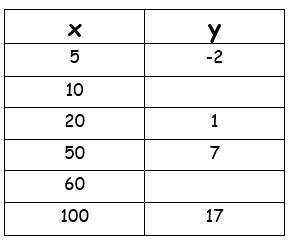
What are the missing Values in the table ?
Solution :
Let a and b be the missing value.
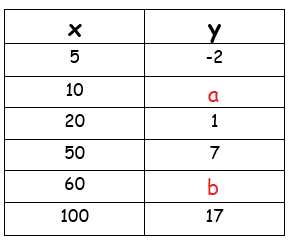
|
a = 10/5 - 3 a = 2-3 a = -1 |
b = 60/5 - 3 b = 12-3 b = 9 |
Therefore, missing values is -1 and 9
Problem 9 :
A polyhedron has four faces, four vertices, and six edges. Each face is a Triangular shape. What is the name of the shape ?
(A) Decahedron (B) Tetrahedron
(C) Cube (D) Dodecahedron
Solution :
A polyhedron has four faces, four vertices,
and six edges. Each face is a
Triangular shape is Known as Tetrahedron.
Tetrahedron is a shape with a triangular base and sides.
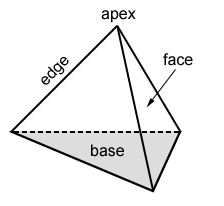
Therefore, Tetrahedron is the name of the shape.
Problem 10 :
All the shapes below which have rotational symmetry.
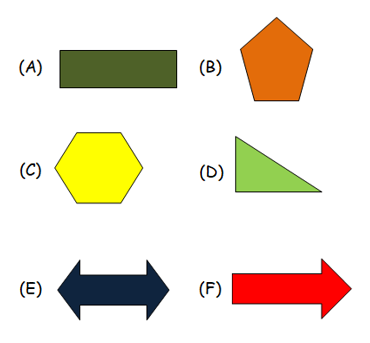
Solution :
A regular hexagon has rotational symmetry.
The angle of rotation is 60˚ and the order of the rotational symmetry is 6 .

So, Option (C) has rotational symmetry.
Problem 11 :
Carmine has 291 balloons. She put the same number of balloons into 3 groups. What is the best estimate of the number of balloons in each group?
A) 90 B) 100 C) 75 D) 85
Solution :
Number of ballons that Carmine has = 291
Estimating it, we get 300 ballons.
Number of sections to be divided = 3
= 300/3
= 100
So, each group will have 100 ballons.
Problem 12 :
A zoo had 82,649 visitors last year. What is 82,649 rounded to the nearest ten thousand?
A) 80,000 B) 90,000 C) 83,000 D) 82,600
Solution :
Number of visitors last year = 82649
Rounding to nearest ten thousands,
= 80000
So, option A is correct.
Problem 13 :
A cashier worked 6 hours each day for 8 days. The cashier was paid $10 for each hour worked. Which equation represents t, the total amount the cashier was paid for the hours worked?
A) 10 × 6 = t B) 6 × 8 × 10 = t C) 6 + 8 × 10 = t
D) 10 × 8 = t
Solution :
Number of hours he works = 6
Number of days he is working = 8
Total number of hours he is working = 6 x 8
Amount paid by cashier for each hour = $10
Total amount paid = 6 x 8 x 10
So, option B is correct.
Problem 14 :
A family plans to drive 1,584 miles in 4 days. The family will drive the same number of miles each day. Which equation could be used to find the number of miles the family will drive each day?
A) 1,584 + 4 = 1,588 B) 1,584 × 4 = 6,336
C) 1,584 ÷ 4 = 396 D) 1,584 – 4 = 1,580
Solution :
Distance to be covered = 1584 miles
Number of days they are planning = 4
Number of miles covered on each day = 1584 ÷ 4
= 396
So, option C s correct.
Subscribe to our ▶️ YouTube channel 🔴 for the latest videos, updates, and tips.
Kindly mail your feedback to v4formath@gmail.com
We always appreciate your feedback.
About Us | Contact Us | Privacy Policy
©All rights reserved. onlinemath4all.com

Recent Articles
-
Digital SAT Math Problems and Solutions (Part - 1)
Feb 05, 26 09:37 AM
Digital SAT Math Problems and Solutions (Part - 1) -
AP Precalculus Problems and Solutions
Feb 05, 26 06:41 AM
AP Precalculus Problems and Solutions -
SAT Math Preparation with Hard Questions
Feb 05, 26 05:30 AM
SAT Math Preparation with Hard Questions

